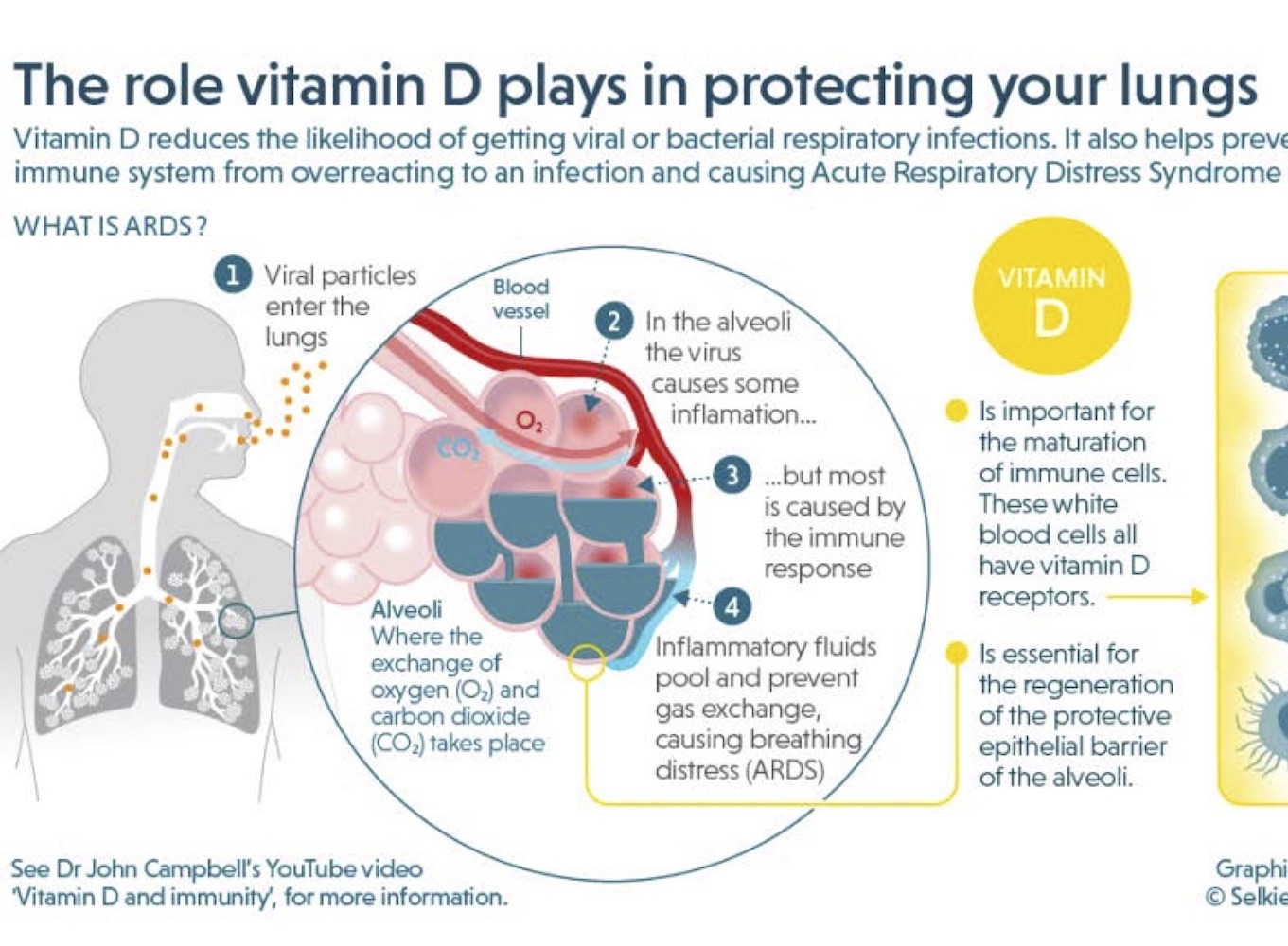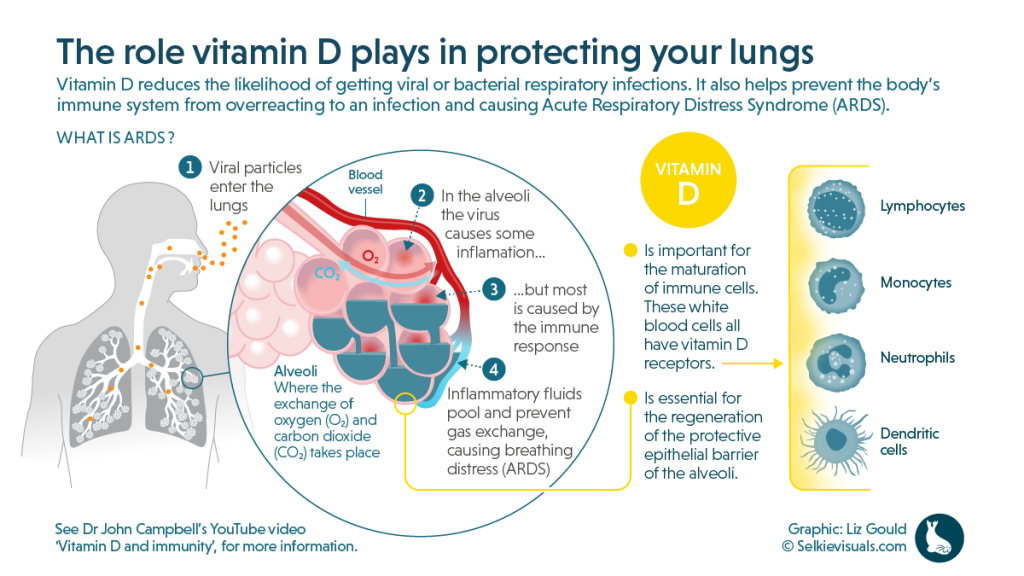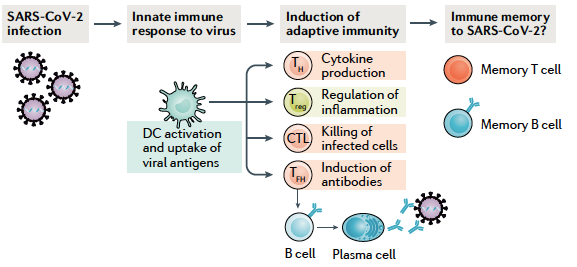How Vitamin D Helps Fight COVID-19: Part 1

From GrassrootsHealth
A simplified review of how vitamin D helps to protect against COVID-19 infection and improve outcomes in those with COVID-19
Vitamin D deficiency has now been shown to increase susceptibility to COVID-19 and increase the risk of COVID-19 severity, including ICU admission and death. Conversely, other published studies have also shown those with higher vitamin D levels (over 30 ng/ml or 75 nmol/L) have a reduced risk of severe symptoms and death due to COVID-19. In fact, an analysis of over 190,000 Americans found that having vitamin D levels of at least 50 ng/ml resulted in a 53% lower positivity rate than those whose levels were less than 20 ng/ml! The first-published randomized controlled trial on vitamin D and COVID-19 found that adding vitamin D to the standard treatment nearly eliminated ICU admissions and did eliminate deaths.
It sounds almost too good to be true… Yet vitamin D is known to influence the expression of thousands of genes and is involved in regulating over 80 biological pathways in the body. Vitamin D is not a miracle drug, nor does it act alone, but it is an important mediator of immune function, and we can largely control whether or not we get enough vitamin D from our daily habits (sun, diet and supplements).
Today we will explain HOW vitamin D acts to protect you from getting COVID-19, and in an upcoming Part 2, we will discuss how vitamin D helps improve symptoms if you do get COVID-19.
Vitamin D is Known to Help Prevent Upper Respiratory Tract Infections
 Vitamin D is known to help fight upper respiratory tract infections. As previously discussed, a large meta-analysis including 25 randomized controlled trials with over 11,300 individuals showed that vitamin D supplementation reduced the risk of respiratory tract infections by 70%. GrassrootsHealth participants with vitamin D levels greater than or equal to 40 ng/mL were 41% less likely to have had the flu and 15% less likely to have had a cold in the prior 6 months than participants with levels less than 20 ng/mL.
Vitamin D is known to help fight upper respiratory tract infections. As previously discussed, a large meta-analysis including 25 randomized controlled trials with over 11,300 individuals showed that vitamin D supplementation reduced the risk of respiratory tract infections by 70%. GrassrootsHealth participants with vitamin D levels greater than or equal to 40 ng/mL were 41% less likely to have had the flu and 15% less likely to have had a cold in the prior 6 months than participants with levels less than 20 ng/mL.
Acute Respiratory Distress Syndrome (ARDS) is a major complication and cause of death among those with serious COVID-19 infections. When comparing vitamin D levels among those with and at risk of ARDS, one study found that 96% of those at risk of ARDS were deficient in vitamin D.
Vitamin D Can Protect Lung Cells from SARS-CoV-2 Attack
COVID-19 is caused by a coronavirus (a specific type of virus) called SARS-CoV-2. Infection of COVID-19 begins when the SARS-CoV-2 virus enters the cells of the lung by binding the angiotensin-converting enzyme 2 (ACE-2) receptor and de-activating it, resulting in inflammation. Vitamin D is responsible for increasing ACE-2 expression, which allows it to carry out its anti-inflammatory actions to help protect the lungs and keep inflammation at bay.
During the early incubation stage when the virus is hijacking the cell there are generally no symptoms. Most people who are infected with SARS-CoV-2 experience mild-moderate respiratory symptoms and recover without any need for hospitalization or therapy. In those who do experience more severe symptoms, only a small percentage have severe enough symptoms for the virus to be life threatening. This difference in both susceptibility (whether the virus is able to invade) and recovery (how well the body fights it off if it does invade) is attributed to the individual’s immune response. Vitamin D may help protect against COVID-19 specifically through maintenance of physical barriers (susceptibility) and regulation of innate and adaptive immunity (mounting an effective immune response to the virus).
The graphic below provides a very clear illustration of several ways vitamin D acts to directly protect the lungs, from its effect on the protective barrier of the lungs, to its involvement in the maturation of immune cells, and its role in regulating the inflammatory response and inhibiting the cytokine storm (which will be covered in more detail in Part 2).
Vitamin D Regulates the Immune Response
Vitamin D plays a crucial role in regulating immune system activity – both innate and adaptive responses. As previously described, the innate immune system is responsible for the initial defensive front with a central role played by phagocytes. Vitamin D stimulates expansion of these phagocytes (monocytes and macrophages) increasing their ability to fight off the virus by increasing their numbers, as well as increasing their killing capacity through stimulating the production of the anti-viral protein cathelicidin. Vitamin D also acts to regulate the maturation of dendritic cells which are important for activating CD4+ T cells and in turn the rest of the immune response.
Earlier studies have shown that in SARS and influenza the adaptive immune cells, T cells and B cells, are vital in defending the body against the virus. Many studies have found this to be the case in COVID-19 as well, with both antibody and cellular defenses being recruited to the fight. Vitamin D is a potent regulator of adaptive immunity, including both cell-mediated (T cell) and humoral (B cell) immunity.
Cox R and Brokstad K, Nature Reviews, 2020.
Click to Download & Print
Once SARS-CoV-2 has been successful at replicating itself and spreading to surrounding cells, mild to moderate symptoms progress (e.g. sore throat, cough, fever and muscle aches) that result from localized and appropriate inflammation, associated tissue damage and antiviral activity of B cells and T cells. CD4+ and CD8+ T cells secrete cytokines (chemical signals that instruct other cells what to do) and are central to the successful elimination of COVID-19, as happens in most people. Unfortunately, more serious symptoms and death can result with an over-reactive or ineffective immune response, as can happen when there is not enough vitamin D for use. The role of vitamin D at this stage will be covered in Part 2.
Thus, vitamin D is important to help fend off an attack by SARS-CoV-2. Ensuring optimal levels of vitamin D is an easy way to help support your immune system response.
Click here to read more from GrassrootsHealth.
SmartTan.com news articles regularly report medical and scientific information to keep you abreast of current events related to UV light. This information is not intended to be used by any party to make unwarranted health claims to promote sunbed usage. Indoor tanning businesses are obligated to communicate a fair and balanced message to all clients about your products and services including the potential risks associated with indoor tanning. Contact your Smart Tan representative to find out more about what you can and can’t say in your tanning salon business.
© 2020 International Smart Tan Network. All rights reserved.


